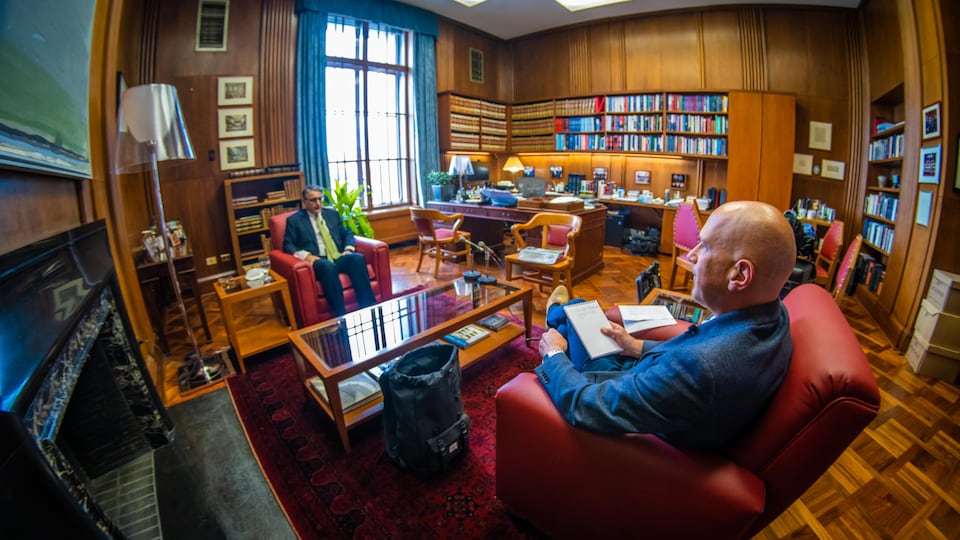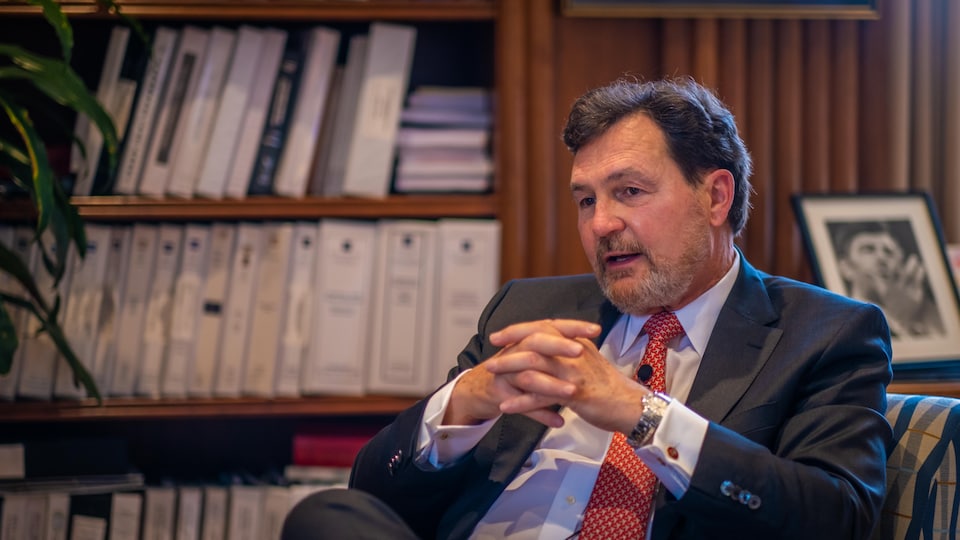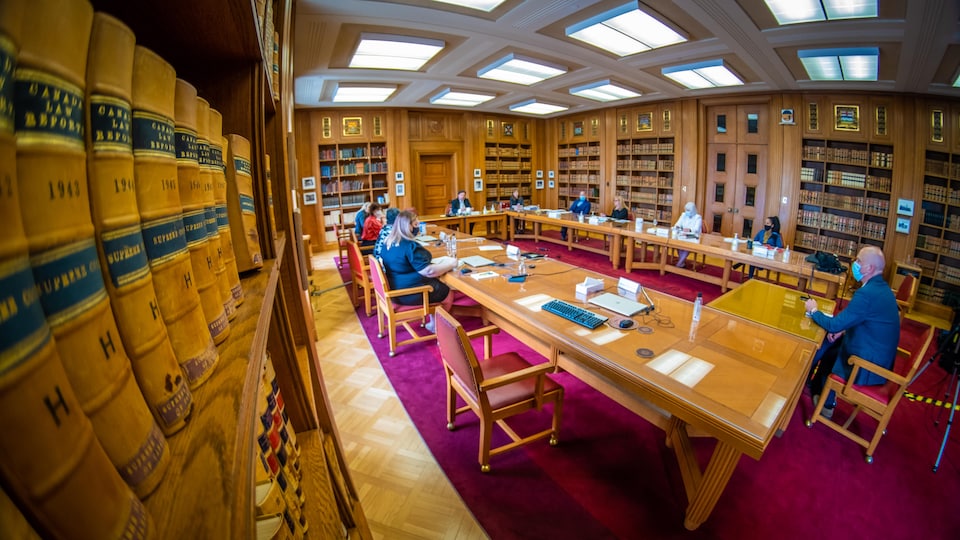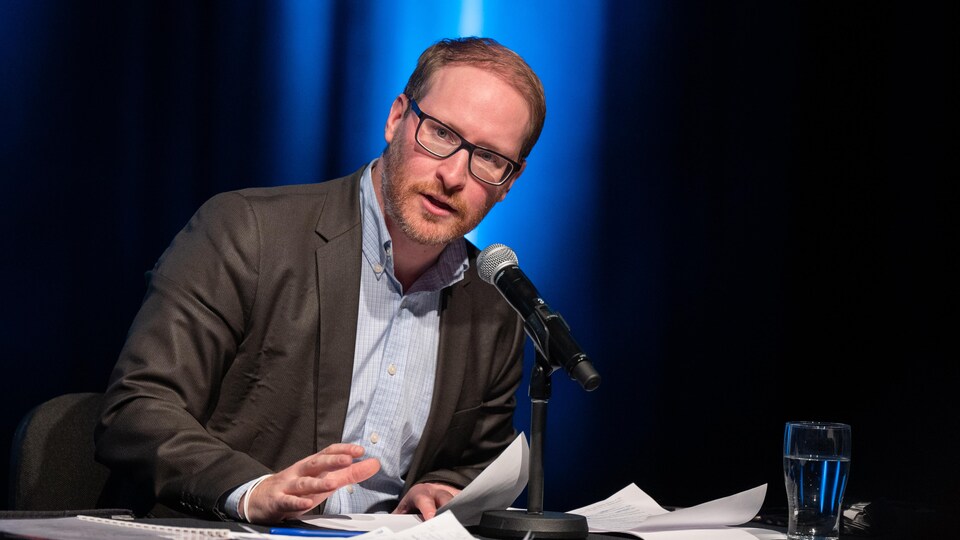Mahmud Jamal is neatly seated in a magnificent red leather chair, near the certificate signed by the Governor General giving him the title of Justice of the Supreme Court of Canada.
The path the 55-year-old judge took to get to this wood-paneled office on the banks of the Ottawa River was unusual. An immigrant of Indian descent, he was born in Kenya, lived part of his youth in England and settled in Edmonton in 1981, at the age of 14.
I remember the first day here. I was scaredhe says. I was scared for many reasons: I left all my friends, I left a culture where I had spent my whole life. But at the same time, it is a possibility to start life again.
From a small family moving in search of better living conditions, Mahmud Jamal rose into the ranks of the Canadian legal world, from his legal training at McGill University to his swearing -in in the nation’s highest court in July . 2021.
Mahmud Jamal’s first media interview as a Supreme Court Justice was conducted entirely in French, a language he learned in Edmonton and perfected in Montreal.
Obviously, in Montreal, there are many more opportunities to practice the language, but that was especially when I worked at a company in Montreal for two summers. It’s a completely French atmosphere. And also when I worked at the Quebec Court of Appeal for Judge [Melvin] Rothman, this is an opportunity to deepen my knowledge of French, especially legal vocabulary.
Judge Jamal is still taking French lessons in Court. And he made bilingualism a family value, he whose two sons will be attending university in Montreal this fall.
I never thought of the possibility that the French language would be useful for my legal work. […] But this is the same thing I say to my kids, bilingualism is a useful asset, you never know when it will be useful for work. I encourage them to learn the language, to immerse themselves in the culture of Quebec.
Bilingualism: a priority for the Chief Justice
The appointment of Justice Jamal, in 2021, proves in the eyes of the Chief Justice of the Supreme Court that the federal government is very good at appointing judges who are both bilingual and from diverse backgrounds.
We mentioned that we may be depriving ourselves of quality people who don’t know how to be bilingual. Well, that’s not an issuehe said in a separate interview.
People with skills and aspiring to one day sit in the Supreme Court of Canada know they must be bilingual. If they don’t, and if they have quality, and even if they’ve learned ithe says.
The prime minister will have to fill a vacancy in the Supreme Court this summer with a judge from Ontario who will be bilingual, according to Trudeau government policy.
Although the obligation to appoint bilingual judges is not yet enshrined in law, Chief Justice Wagner has been pushing for it for several years, saying it is a matter of respect for French speakers in the country.
Bilingualism in the Supreme Court is more than the ability to listen to oral arguments in the language of lawyers facing judges. There are many legal documents that are not translated, as well as work meetings where each employee can speak in the official language of their choice.
I think we have progressed over the last few years and we have reached the point that we no longer have to save. We really need to recognize the importance of all judges having to be functionally bilingual in court.said Chief Justice Wagner.
Bill C-13, which is still in Parliament, would require Supreme Court justices to be bilingual.
The protection of minorities
Like any candidate for a position of Supreme Court judge, Mahmud Jamal completed a complete questionnaire describing his personal and legal background. In the section on his views on the role of judges in a constitutional democracy, he replied:
” An important part of a judge’s job is to protect the rights of minorities and other historically disabled groups under the Constitution, even if it may not be popular. “
Not only is he a member of the visible minority, he is also a member of the religious minority. Mahmud Jamal grew up as a Muslim in the Ismaili community, before joining the Bahai community, like his wife, who is an Iranian refugee.
In an interview, he proved that his personal experience is an asset for the Court, as is each of the individuals who make it up.
If you are a woman, if you are a man, if you yourself are a member of a minority, you bring your work experience. I have experiences as a member of a visible minority, of a religious minority, so it provides a different perspective.
He added – twice instead of once – that his faith would not change in his legal decisions.
That doesn’t mean I will decide on all the reasons in favor of minoritieshe insisted.
Rule 21
As dictated by their decision -making role, Judge Jamal and Chief Justice Wagner did not comment on cases that are likely to succeed them, including Quebec’s law on State secularism that will soon be debated in Court. .
Sherbrooke University law professor Guillaume Rousseau – who also advised the Quebec government on Bill 21 – is convinced Judge Jamal will understand things if the case goes to him, regardless of his personal beliefs. .
He must judge on the validity of the evidence, and in the evidence, there is as much testimony from minority members who want to wear religious symbols as there are testimonies from minority members who do not want to wear religious symbols. those in positions of authority. . If Judge Jamal came with an open mind, to hear both sides of the coin … that’s finesaid Guillaume Rousseau.
Chief Justice Wagner recalled that candidates for a position on the Supreme Court are first evaluated by an independent committee based on their professional qualifications.
Although the nine judges often came from different provinces, with different languages and different professional backgrounds, different life experiences, different ethnicities. origin, we come here with the same Canadian values, I will tell you, which is the same Quebec or elsewhere. in the country, in terms of the values of freedom, impartiality and respect for institutions.
Source: Radio-Canada



